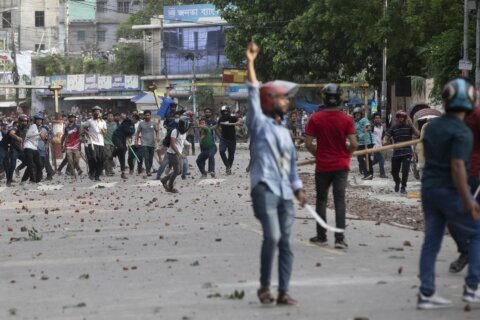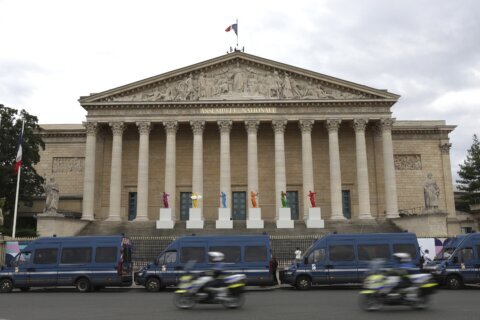TUNIS, Tunisia (AP) — Leading opposition parties in Tunisia asserted Wednesday that politically motivated arrests and gag orders are creating impossible conditions for holding democratic elections later this year.
Members of the National Salvation Front, a coalition of secular and Islamist opponents to President Kais Saied, said a government crackdown on opponents had created a climate of fear, making campaign requirements like signature-gathering nearly impossible.
“There is a clear message behind all these targeted arrests,” Riadh Chaibi, a leading member of the Islamist party Ennahda, told a press conference in the capital of the North African nation.
He said the coalition had counted more than 300 people currently imprisoned on political charges.
Leaders of Ennahda and other parties in the Front described recent arrests and limitations on those planning to challenge Saied a “suffocation in terms of freedoms, human rights and basic rights for Tunisians.”
They said they have little choice but to boycott the October presidential election, something that many parties had previously announced in protest of the country’s authoritarian drift.
“Authorities seem to find comfort in this boycott, allowing them to move forward with the electoral process without any political opposition,” Chaibi said.
“There can’t be political stability without opposition,” he added.
For months, many of Tunisia’s leading opposition figures have languished behind bars, including Abir Moussi of the Free Destourian Party and Ennahda’s Rached Ghannouchi.
Ennahda, which commanded a majority in Tunisian politics during the years that followed 2011’s Arab Spring, was dealt another blow over the weekend when police arrested its secretary general, Ajmi Lourimi, along with two other party members during a routine traffic stop.
Authorities did not announce charges or show judicial permission for the arrests, the party said in a statement on Sunday. The arrests sparked outrage from rights advocates including Amnesty International.
“It is outrageous to see the Tunisian authorities trampling on people’s rights in their bid to undermine the political opposition,” Amnesty said in a statement on Tuesday.
Such arrests have become increasingly common in Tunisia since Saied took power in 2019 and began a campaign that critics say has reversed the country’s path toward democracy. In the years before he was elected president, the nation of 12 million people emerged as a regional beacon of hope, overthrowing a longtime dictator in a peaceful revolution, rewriting its constitution and winning a Nobel Peace Prize for political compromise.
But signs of authoritarianism have re-emerged since Saied took power while promising to fight corruption and lift the country from years of economic malaise in ways democracy couldn’t. He has suspended parliament, rewritten the constitution to consolidate his power and arrested politicians, activists and journalists who criticized him.
He has yet to announce plans to run for a second term in the election, but his critics see authorities’ moves against the opposition as stacking the deck in his favor.
“We don’t see any basic conditions being reunited at all for a fair and transparent electoral competition,” said Samir Dilou, a longtime Ennahda member and attorney who is defending several of the coalition’s imprisoned politicians.
Though several parties in the coalition have long planned to boycott the election, others had intended to seek the signatures necessary to get their candidates on the ballot.
Abdellatif Mekki, the leader of coalition member Work and Accomplishment, announced plans to challenge Saied but later had his movements restricted and was subjected to a gag order by a Tunis judge as part of a 2014 murder investigation that critics have called politically motivated.
Such developments have instilled fear among the electorate, Ahmed Neffati, Work and Accomplishment’s deputy secretary general, told The Associated Press.
“We can see that as a result of the arrests, people are getting afraid and express reluctance in showing any form of support,” he said.
__
Sam Metz contributed from Rabat, Morocco.
Copyright © 2024 The Associated Press. All rights reserved. This material may not be published, broadcast, written or redistributed.







